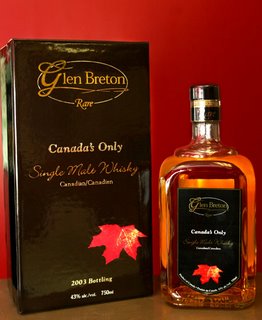

Do Scottish distilleries own the word Glen? When it comes to using the word on a bottle of whisky they apparently believe so.
The Scotch Whisky Association and the Glenora Distillery from Cape Breton, Nova Scotia, faced off this week before the Canadian Trademark Commission over the issue. The closed-door trademark hearing last for three hours. In a battle that started in 2001, the Scotch Whisky Association has complained that the use of the name Glen Breton Rare Single Malt Whisky as one of Glenora's brands could mislead consumers and cause them to think they are drinking a whisky from Scotland.
Glenora has countered that the whisky is distilled in Glenville and the word Glen in the brand refers to that location. Glenora says it has held off on a marketing program until the dispute is settled. It may be three more months before a decision is released. The Glenora Distillery started production in 1990 and makes 250,000 litres of whisky annually. It is the only single malt in Canada.
While the Scotch Whisky Association must fiercely defend Scotch from foreign counterfeits, it is difficult to imagine that anyone could be misled by the Glen Breton Rare brand, since the label and box clearly state in large type "Canada's Only Single Malt Whisky" and "Canadian/Canadien" appears elsewhere, as does a portion of the Canadian national symbol, the red maple leaf.
If the Canadian Trademark Commission rules against the distillery, it might cause other well known "Glens" to have to change their names, including the 1992 movie GlenGary Glen Ross, former U.S. Senator John Glenn and the village of Watkins Glen, N.Y.
1 comment:
Woo hoo! Finally, somebody being sued over the copyright issue of whether it/he/she has the rights to use its/his/her own name against that of a multi-national corporation.
Why don't you ask this question to persons named McDonald, in the U.S.A. or Canada?
Does it have any success using its surname anywhere in its name?
Or would it be swiftly and summarily sued?
Post a Comment